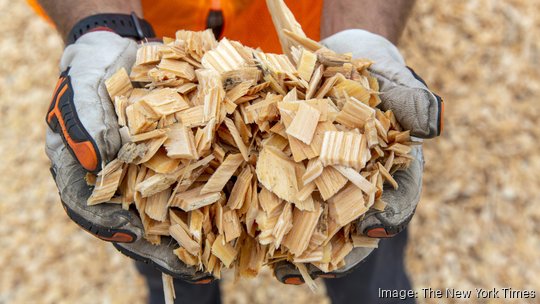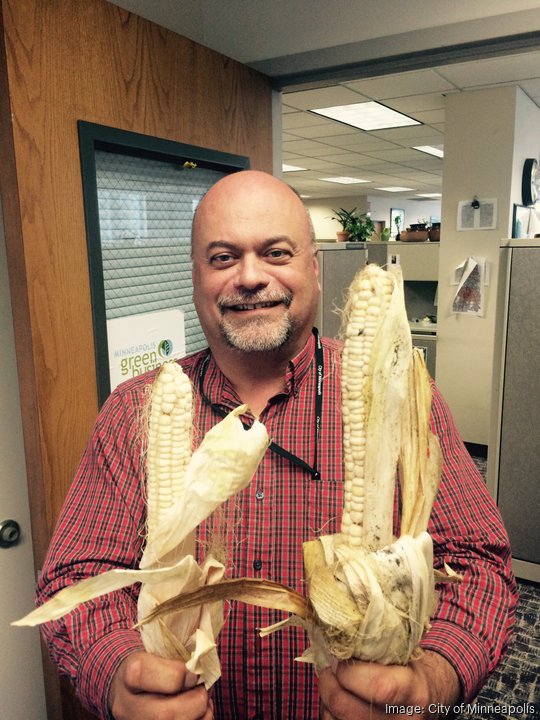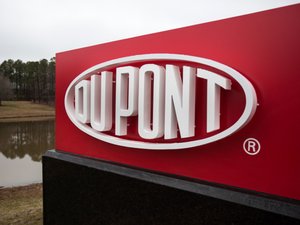
The city of Minneapolis will build a $1.5 million biochar production facility — one of the first city-owned plants of its kind— to turn wood debris into a soil-enriching, charcoal-like substance.
The city is one of the first customers of Old Saybrook, Connecticut-based BluSky Carbon (CSE: BSKY), a carbon-removal startup that makes pyrolizers, specialized devices that heat wood at above 500 degrees with little to no oxygen. This process, called pyrolysis, traps the carbon from the wood into a porous substance called biochar that's great for soil. The city purchased the technology from BluSky for $575,000.
This fall, the city will begin operating the biochar production facility near Huntington Bank Stadium. The 4,242-square-foot building will be located at 670 25th Ave. SE. When in operation, the facility will be able to handle up to 3,600 tons of wood debris and produce more than 500 tons of biochar each year. The city has had a biochar program for several years, but purchased the substance from out-of-state facilities for its projects.
The biochar facility is being funded through grants and city funds. In 2022, Bloomberg Philanthropies awarded a $400,000 grant for the expansion of the city's biochar program. The city will match the grant and also use $300,000 in funds from the City Council's climate legacy initiative for the construction of the facility. Those funds also purchased the pyrolizer from BluSky.
The potential for the city to make revenue off the new plant won't come from selling the finished biochar product, but more through selling carbon credits to corporations.
Companies offset their emissions of greenhouse gasses by purchasing carbon credits from projects that reduce carbon output. However, they are only allotted a certain number of credits. One credit permits the emission of 1 ton of carbon dioxide. Carbon credits were between $40 and $80 per metric ton in 2023. The global carbon credit market was valued at $414.8 billion in 2023 and is expected to grow to $1.6 trillion by 2028.
"Carbon credits would improve the project’s viability and help the city achieve carbon neutrality," said Scott Wasserman, communications coordinator for the City of Minneapolis Health Department.
Besides using the biochar for city landscaping needs, it plans to sell it for government infrastructure projects throughout the Twin Cities area. The goal is for the facility to be self-sustaining financially.
"There is widespread and growing government interest in using biochar," Wasserman said. "The lack of availability has limited its use in local and county projects."
The wood to produce the biochar will come through a partnership with Minneapolis-based Xcel Energy Inc., when the company cuts limbs that are a fire hazard near lines, as well as several tree-care businesses and county facilities.
Wasserman said the city has reached a crisis in its ability to handle wood waste. "This is partially due to themerald ash borer and increased storm damage," Wasserman said. "This will allow us to help manage the wood waste, responsibly sequester carbon and improve our climate resilience."

Jim Doten, manager of the city of Minneapolis Health Department's Carbon Sequestration Program, began the biochar program by using it in gardening projects. Those projects were in the city's Green Zones — communities that have been affected by racism, pollution, and political and economic marginalization. The program has since helped communities in Phillips, Windom and Tangletown and North Minneapolis.
"Climate change affects us all, but not all equally," Doten said. "Our focus is trying to help those who are most at risk."
Through Doten's use of biochar in projects, he's noticed a significant increase in the size of the plant produced and its condition. Biochar promotes soil health in different ways. It provides a home for microbes that break down organic matter, loosens compacted soil that allows for better air and water flow, and soaks up water and nutrients, releasing them slowly over time.
Another advantage of biochar is that producing it and using it is that it's carbon-negative.
"It’s adding capacity back in for our carbon budget," Doten said. "You can’t achieve carbon neutrality without some carbon negative."






